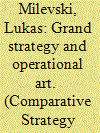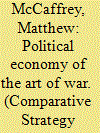| Srl | Item |
| 1 |
ID:
134654


|
|
|
|
|
| Summary/Abstract |
Over the past decade, much has been made of the People's Republic of China's (PRC) growing maritime ambitions, both within its territorial waters and in neighboring oceans. However, as foreign analysts grapple with how to translate China's somewhat conflicting strategies into a unified strategy, they often are unable to find guidance from the government itself. As a result, the current metaphors that are used to describe China's naval strategies have become muddled and somewhat disconnected from both government rhetoric and military action. This article reexamines the frequently cited “String of Pearls” metaphor that has been used by many analysts to describe China's maritime ambitions within the Indian Ocean region. Instead of viewing its naval plans as inherently hostile and expansionist, this article makes the argument that it is more accurate to describe China's ambitions as part of a larger strategy that emphasizes both offensive and defensive capabilities stretching from the Indian Ocean to the East China Sea. This framework, which this article coins “the Bow and Arrow” strategy, sees the bulk of China's naval resources devoted to defensive efforts in the South and East China Seas. The Indian Ocean is of secondary importance and likely to only be a theater for occasional, limited excursions.
|
|
|
|
|
|
|
|
|
|
|
|
|
|
|
|
| 2 |
ID:
134651


|
|
|
|
|
| Summary/Abstract |
This article examines the relationship between two concepts in strategic studies, grand strategy and operational art, to consider their aggregate effect on the fundamental concept of strategy. Grand strategy as a higher level of strategy fails to account for the entire ends-ways-means logic of strategy, thus requiring the introduction of another concept to compensate. Parallels are drawn between this conceptual dichotomy and the current practice in modern civil-military relations. Its conceptual division into two other distinct ideas is counterproductive to the fundamental task of strategy, although its practice is necessarily divided.
|
|
|
|
|
|
|
|
|
|
|
|
|
|
|
|
| 3 |
ID:
134650


|
|
|
|
|
| Summary/Abstract |
The inter-organizational lesson in the fight against terrorism has been clearly identified after 9/11, but not completely learned and applied. Horizontal cooperation and coordination structures have been established, yet due to many challenges they do not function optimally. This article reaches beyond the prevailing mantra concerning the need for inter-organizational cooperation in the fight against terrorism by providing a framework for understanding the complexity of network counterterrorism and the relevant challenges. It introduces four levels of complexity that must be comprehended in order to ensure an optimal and comprehensive strategic approach in this fight. Based on this, it argues that a successful counterterrorism strategy needs to provide capacities for multi-organizational, inter-organizational and network-horizontal cooperation, and the capacity to manage many related inter-organizational challenges. The conclusions also suggest that our societies are still not conceptually and practically ready to embrace a truly comprehensive network approach to a networked threat. The inter-organizational approach in the fight against terrorism is ultimately what organizations make of it.
|
|
|
|
|
|
|
|
|
|
|
|
|
|
|
|
| 4 |
ID:
134653


|
|
|
|
|
| Summary/Abstract |
Western states—the U.S. and many European states—have since the early 1990s conducted military operations at a pace that overshadows the number of military operations during the threat-penetrated Cold War era. During the last twenty years, Western states have switched their military outlook from containment and deterrence toward active engagement and expeditionary warfare. It is argued that even though in many cases the objectives of military activism are good and noble, the unintended—and in many cases the unrecognized—consequences of such action will in the long run be negative at best—and potentially even dangerous.
|
|
|
|
|
|
|
|
|
|
|
|
|
|
|
|
| 5 |
ID:
134649


|
|
|
|
|
| Summary/Abstract |
Nuclear weapons are uniquely capable of threatening entire countries’ existences, but not all nuclear weapons possessors are equally capable of posing such threats. This article explores the existential threats that nuclear weapons possessors pose with a new, empirically based metric called the Nuclear Annihilation Threat (NAT) Index. Using the NAT Index, we comparatively analyze the existential threats and vulnerabilities that nuclear-armed states face from one another. In particular, we apply these insights to gain a better understanding of the nuclear security threats and vulnerabilities of the United States and Israel and explore the implications of Iran going nuclear for both countries.
|
|
|
|
|
|
|
|
|
|
|
|
|
|
|
|
| 6 |
ID:
134652


|
|
|
|
|
| Summary/Abstract |
Sun Tzu's The Art of War deals with the economic aspects of military operations as well as some more general economic principles. This article studies several of its economic ideas in turn: on war and the state, the effect of war on economic affairs, and the role of incentives in promoting desired behavior within military organizations. It also discusses how the text treats ideal military strategy as a matter of opportunity discovery, analogous to entrepreneurship in the work of Israel Kirzner.
|
|
|
|
|
|
|
|
|
|
|
|
|
|
|
|